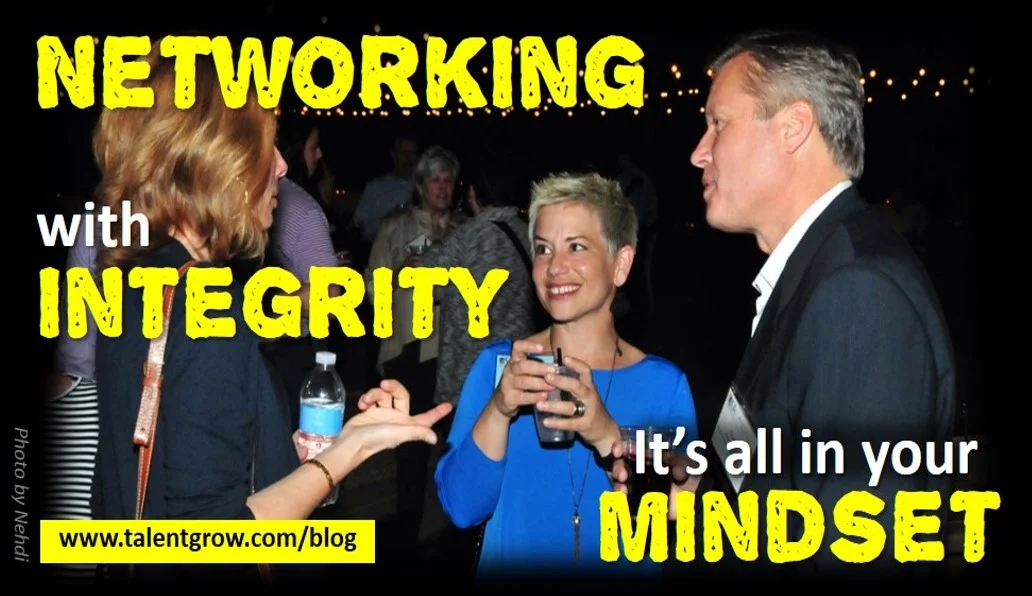Networking with integrity: It’s all in your mindset
/When you think of the word ‘networking’, what comes to mind?
If you get an icky feeling in the pit of your stomach, keep reading.
First, you’re not alone. I find that most people have some variance of an aversion to networking. But when we dig deeper, it’s often because they’re thinking of the kind of “networking” that people with the wrong mindset do. The kind of networking that gives networking a bad rep.
I think I’m kind of a crusader for righting the reputation of networking. I want to bring honor back to this important activity. And it all starts with getting your mindset straight.
The right kind of networking – the honorable kind, the kind with integrity and dignity – starts with an abundance mentality and a trader-principle approach. I’d like to explore these mindset foundations in this blog post.
Adopt an abundance mentality
Your attitude toward life in general, including networking, is either one of abundance or scarcity. Stephen Covey first coined these terms in his classic book, The Seven Habits of Highly Effective People. The scarcity mentality is an internal thinking script that tells us life is a zero-sum game. People who hold this kind of mentality think there isn’t enough of [fill-in-the-blank] to go around: opportunities, luck, value, ideas, and all manner of good things. So they think that if they give it away, they won’t have enough for themselves.
People with a scarcity mentality are therefore very reluctant to share anything, including credit, power, or even recognition. If you always think there isn’t enough, you become stingy, narrow-minded, and hyper-competitive. You see networking as a win-lose game. Not to mention petty, miserable, and unhappy.
When it comes to networking and building mutually-beneficial relationships, the scarcity mindset is a game killer.
On the other hand, those with an abundance mentality see the world as full of opportunities and possibilities, with plenty for everyone to share. They are much more willing to share praise, ideas, opportunities, and connections – all great for the work of building relationships!
They understand that networking can lead to win-win outcomes and are eager to share their knowledge, connections, and ideas with others in their network.
If you want to succeed at networking (the honorable, non-icky kind), you must adopt an abundance mindset.
Trade for mutual value
According to philosopher and author Ayn Rand, “[a] trader is a man who earns what he gets and does not give or take the undeserved. He does not treat men as masters or slaves, but as independent equals. He deals with men by means of a free, voluntary, unforced, uncoerced exchange—an exchange which benefits both parties by their own independent judgment.” (Source)
What constitutes value?
Trick question.
Value, like the proverbial ‘beauty’, is in the eye of the beholder.
There’s no way to state an objective standard of value for all trades or relationships. There are many ways to give or receive value, and they all go well beyond money. Here is just a partial list, to get your creative juices flowing:
- Money (well, duh!)
- Credit/honor
- Connections
- Ideas
- Praise/recognition
- Awards/rewards
- Opportunities
- Insider information (legal, of course)
- What else? Use the comments section to add to this list!
The value you want to gain could be very different from the value your counterpart seeks. Therefore, to create a fair trade, you must figure out what they value that you could, and would be willing to, offer them in return for the value you seek. Don’t be limited by your own needs and preferences.
I like to suggest eschewing the ‘Golden Rule’ in favor of the ‘Platinum Rule’:
Do unto others not what YOU would like done unto you, but rather what THEY would like to have done unto them.
The Platinum Rule: Treat others as THEY would like to be treated." {Tweet that! Click here!}
But of course, to execute a trade like this requires some proactive curiosity on your part – you must figure out what THEY would like!
Viewing networking through the lens of the trader principle with the goal of value creation immeasurably expands the ways in which you can add value.
But what if the other person is much more successful or powerful than me? How could I possibly offer them a value?
A lot of people are worried about what they fear would be an imbalanced relationship. They don’t want to feel like they’re taking advantage of anyone. They also worry that the other person won’t see what’s in it for them and will not be interested in connecting.
What’s really great is that when seen this way (that is, through the trader principle lens), relationships can become mutually-beneficial even if you're the less powerful/famous/rich/experienced one in the relationship.
Have you considered that one of the most pleasurable things for somebody who is successful is to help other people be successful? Author and philosopher Don Watkins talked about this on episode 38 of my podcast, The TalentGrow Show. He suggested that when offered the opportunity to connect with and help the eager up-and-comer, it can be seen as, “how cool is it that I can give my younger self what I wish I had when I was there.”
Another, even more practical type of high leverage value you can offer such a person, according to Watkins, is to help them get to the results they seek in the world without having to do all the work.
How so?
Suppose this person is an author and you are a young professional seeking their counsel. That author can only write so many books, but if she can give 20 hours to somebody over a period of a year or two and then that protégé writes a bunch of books that she likes and thinks are valuable, that is a huge return on investment for her.
One thing that you want to think about in these kinds of potentially-imbalanced relationships is to keep it as a very low investment relationship for the higher-status person. Show deference for the person’s time and recognize that the amount of time they’re able and willing to invest in your relationship may be disproportionately lower than the amount of time you are able and willing to put in.
So if you want their advice, for example, be sure that you ask them very concrete questions that you wouldn’t have been able to look up the answers to by yourself, especially in their former writing or other work products. Then, you MUST go do whatever it is that they suggest.
More from Don Watkins: “Don’t argue with them, even if you disagree or think it’s weird or it makes you uncomfortable because they’re asking you to do something that’s outside your comfort zone. Go do it and then report back the results and then if you have a follow-up question, ask it. Because the number one thing that happens when people ask a successful person for advice is they ask for advice and then they don’t take it. They don't do anything. They don’t take any action... If you take action and report the results, you go a really long way to securing somebody’s interest in helping you in the future.”
Sum-Up
- Networking has a bad rep. It’s usually because of people who do it wrong. Don’t be one of them.
- To network with integrity, you must adopt the right mindset.
- An abundance mentality helps you see the world, and networking, as full of possibilities rather than a zero-sum game.
- By adopting a trader-principle approach you can always ensure you are offering value in exchange for the value you receive. And there are lots of types of values to trade.
- Even if you’re interested in connecting with people who are more successful than you, there are still ways to make the relationship a high-value, fair trade one
Your turn
What do you think? Have you ever struggled with the wrong mindset when it comes to networking? Do you have more examples of types of values that can be exchanged by traders in a relationship beyond those I listed? Do you have any examples of a time when you applied any of these ideas and their beneficial results?
[Hey: don’t feel like you need to answer ALL of these questions. Just pick one! Go ahead, comment below and let’s get a conversation going!]
Sign up to my free weekly newsletter and get more actionable tips and ideas for making yourself a better leader and a more effective communicator! It’s very short and relevant with quick tips, links, and news about leadership, communication, and self-development. Sign up now!
Also, subscribe to my podcast, The TalentGrow Show, on iTunes to always be the first in the know about new episodes of The TalentGrow Show! http://apple.co/1NiWyZo
You Might Also Like These Posts:
3 tricks to take networking from icky to awesome [vlog]
The secret of networking that you can use to make networking less awkward for everyone



